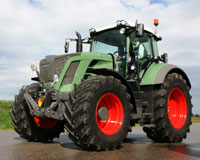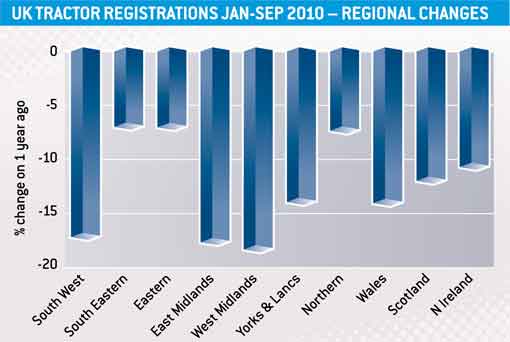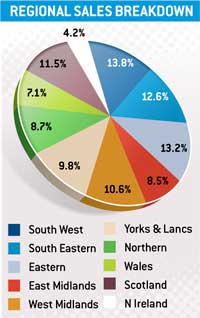Tractor market could have bottomed out

UK registrations of agricultural tractors reached 11,413 units in the first nine months of 2010, a decline of 12.6% on the same period in the previous year, according to the latest figures from the Agricultural Engineers Association (AEA).
Although no region saw an increase in tractor sales, the strongest performances were in the south east (-6.8%), the east (-7.1%) and the north (-7.3%). In contrast, the weakest region was the West Midlands (-18.2%), followed by the East Midlands (-17.6%).
Although the figures represent an overall decline, this is slowing, says Chris Evans of the AEA. “August was the first month this year to see a slight increase in registrations year-on-year, however, September saw a further decline.”
The Midlands and south west held up well towards the beginning of the year, he adds, much higher than expected. This could have been to do with outside income, or because of stronger beef and lamb prices. “Figures have levelled out again, suggesting that tractors have been bought earlier in the year.”

There seems to be a decrease in sales of tractors in the 160hp to 200hp bracket, he explains. “Buyers have been going for the next stage up – tractors over 250hp – having the knock-on effect that fewer tractors are required to meet the hp requirement.”
In contrast, there’s still demand for more modest hp machines of under 100hp. “Dairy and livestock farms still need compact tractors and are not going for larger models for the simple reason they don’t need the hp. This has resulted in the average power of tractors registered this year being just over 143hp – a decline of 1.3% on last year.”
Manufacturers are cautiously optimistic that tractor sales have now levelled out and are slightly more upbeat about the prospects of tractor sales than earlier in the year. “It certainly looks better than it did three or four months ago,” says Mr Evans.
Agco country manager David Sleath doesn’t think it’s going to get dramatically better or worse next year. “We’re looking at probably 14,000-14,500 next year, but it’s very hard to predict the market.

“We are still in a recession and given the general morale of the country and the fact that it’s going to be a difficult winter, this is obviously going to have an impact on buying patterns, even in agriculture.”
Farmers are still uncertain of what’s happening with the SFP in the next couple of years and so, to some extent, are holding back on investing large amounts of money on kit.
“I don’t think that figures will ever get back to the levels seen in 2008,” he reckons.
Mr Sleath agrees, though, that there’s a trend towards buying bigger but fewer tractors. “Big farming businesses are keeping to investment plans, reflected in strong sales of Fendt and Challenger brands.”
The market for smaller tractors is more volatile, he adds. “Businesses that would usually buy 150-200hp tractors are sitting back and waiting to see what happens before committing.”
John Deere’s Chris Meacock largely agrees. “This year is obviously down on last year, and we’re expecting figures to end up around 13,500 units.
“On the back of improved commodity prices we could see a slight improvement on figures next year, but only a marginal increase. The UK market needs about 13,000 registrations to stay level.
“We’re expecting more volatility in machinery sales as commodity prices continue to peak and trough. This will mean keeping a very close eye on the market to ensure optimum production efficiency.”

